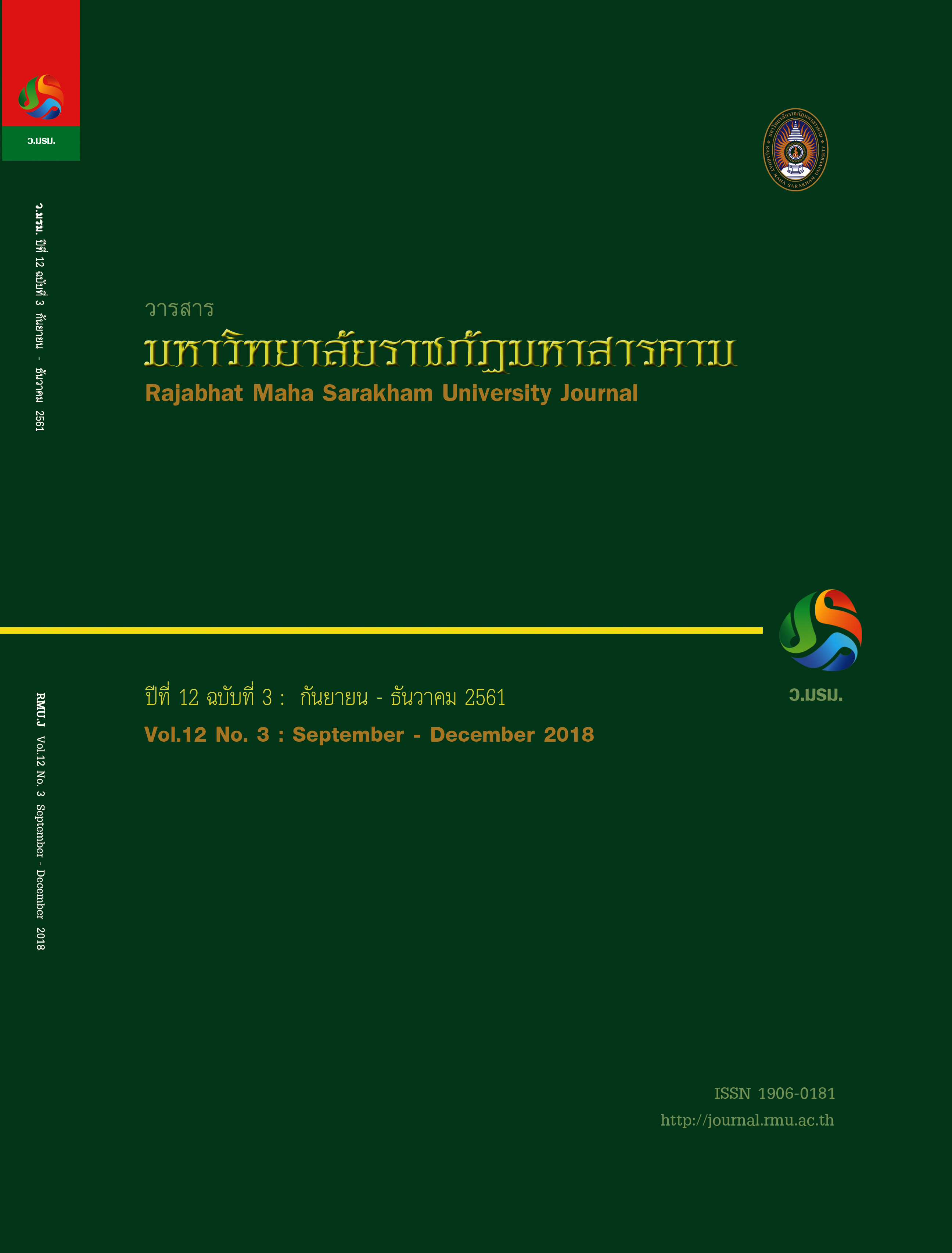การพัฒนาวิถีความเป็นประชาธิปไตยของประชาชนภาคตะวันออกเฉียงเหนือตอนบน
Main Article Content
บทคัดย่อ
การวิจัยนี้มีวัตถุประสงค์เพื่อ 1) ศึกษาวิถีความเป็นประชาธิปไตย 2) ศึกษาปัจจัยที่มีอิทธิพลต่อวิถีความเป็นประชาธิปไตยและ
3) นำเสนอตัวแบบการพัฒนาวิถีความเป็นประชาธิปไตยทำการศึกษาในพื้นที่ ภาคตะวันออกเฉียงเหนือตอนบน กลุ่มตัวอย่างเป็นประชาชน
ผู้มีสิทธิเลือกตั้งในเขตภาคตะวันออกเฉียงเหนือตอนบน จำนวน 500 คน ได้มาจากการสุ่มแบบหลายขั้นตอนและผู้ให้ข้อมูลสำคัญจำนวน 25 คน จากตัวแทนแกนนำการเคลื่อนไหวทางการเมือง ตัวแทนนักการเมืองที่ได้รับการเลือกตั้งไม่น้อยกว่าสามวาระ ตัวแทนภาคประชาชน ตัวแทนนักวิชาการ และตัวแทนผู้นำชุมชน เครื่องมือเป็นแบบสอบถามมาตราส่วนประมาณค่า (Rating scale) และแบบสัมภาษณ์แบบมีโครงสร้างวิเคราะห์ข้อมูลด้วยสถิติพื้นฐานทดสอบสมมติฐานด้วยการวิเคราะห์พหุคูณถดถอยเชิงเส้น และการวิเคราะห์เนื้อหา ผลการวิจัยพบว่า 1) วิถีความเป็นประชาธิปไตยของประชาชนในเขตภาคตะวันออกเฉียงเหนือตอนบนโดยรวมอยู่ในระดับมาก เมื่อพิจารณาเป็นรายด้านอยู่ในระดับมาก 2 ด้าน และอยู่ในระดับปานกลาง 1 ด้าน เรียงลำดับค่าเฉลี่ยจากมากไปน้อย ดังนี้ ด้านการดำเนินชีวิตแบบประชาธิปไตย
ด้านอุดมการณ์แบบประชาธิปไตยและด้านความรู้เกี่ยวกับประชาธิปไตย ตามลำดับ 2) ปัจจัยที่มีอิทธิพลต่อวิถีความเป็นประชาธิปไตยของประชาชนภาคตะวันออกเฉียงเหนือตอนบนอย่างมีนัยสำคัญทางสถิติที่ระดับ 0.001 ได้แก่การกล่อมเกลาของครอบครัว การกล่อมเกลาจากสถานศึกษา การส่งเสริมจากองค์กรชุมชน ทัศนคติต่อการเมือง ความเข้าใจเกี่ยวกับการเมืองการปกครอง และ การมีส่วนร่วมทางการเมือง
ซึ่งสามารถร่วมกันพยากรณ์ได้ร้อยละ 37.4 และมีความคลาดเคลื่อนมาตรฐานเท่ากับ ±0.292 และ 3) ตัวแบบการพัฒนาวิถีความเป็นประชาธิปไตยของประชาชนภาคตะวันออกเฉียงเหนือตอนบน ได้แก่ การปลุกฝังทัศนคติต่อการเมือง การพัฒนาความเข้าใจเกี่ยวกับการเมืองการปกครอง การกล่อมเกลาของครอบครัว การกล่อมเกลาจากสถานศึกษา การส่งเสริมและสนับสนุนจากองค์กรชุมชน และการส่งเสริมการมีส่วนร่วมทางการเมือง
Article Details

อนุญาตภายใต้เงื่อนไข Creative Commons Attribution-NonCommercial-NoDerivatives 4.0 International License.
1. บทความที่ลงตีพิมพ์ทุกเรื่องได้รับการตรวจทางวิชาการโดยผู้ประเมินอิสระ ผู้ทรงคุณวุฒิ (Peer Review) สาขาที่เกี่ยวข้อง อย่างน้อย 3 ท่าน ในรูปแบบ Double blind review
2. ข้อคิดเห็นใด ๆ ของบทความที่ลงตีพิมพ์ในวารสารมหาวิทยาลัยราชภัฏมหาสารคาม นี้เป็นของผู้เขียน คณะผู้จัดทำวารสารไม่จำเป็นต้องเห็นด้วย
3. กองบรรณาธิการวารสารมหาวิทยาลัยราชภัฏมหาสารคาม ไม่สงวนสิทธิ์การคัดลอกแต่ให้อ้างอิงแสดงที่มา
เอกสารอ้างอิง
Department of Local Administration. (2551). Local education statistics; 2007. Bangkok :Volunteer guard :Department of Local Administration.
Morgenthauand, HansJ.and Thompson, KennethW.. (1985). PoliticsAmongNations:TheStruggleforPowerandPeace.6thed.NewYork:Knopf.
Thaksinsuk, Phongsak. (2008) Democratic way of Life of People in Thasala Sub-district, Chiang Mai Province. Master of Politics Research Report (Political Sciences). Chiang Mai : Chiang Mai University.
Nakata, Thinnaphan.(2000). Thai Democracy.2rd ed. Bangkok :Companion Blogging and Printing limited Partnership.
Loathammathas, Anek.(1996). Two Nakkhara Democracy:Political and economic reform for democracy.Bangkok :Matichon Printing.
Arunwed, Theerawut.(2006). CommunityStrengthening by the School process folk for Development hill Conservatively. Research report of National Defense College.
Phrathampidok.(2007). Presentation of theories or concepts in management and organization management of Phrathampidok.Search as 17April 2007.[Online] http://www.spu.ac.th/announcement/gen_ed/annoucemonk.html,2550.
Nakata, Thinnaphan.(2000). Thai Democracy.2rd ed. Bangkok :Companion Blogging and Printing limited Partnership.
Adolkesem, Uthai and Witthaphong, Arasringam. (1997). Community Education System: Conceptual Framework and Research Proposal. Bangkok :Research Fund (TRF).
Yamane, Taro.(1973).Statistics: An Introductory Analysis.3rd Ed. New York.Harper and RowPublications.
Kenaphoom, Sanya. (2014A). “Research Philosophy: Quantity Quality” Journal of Political Science and Law, Rajabhat Kalasin University, 3 (2),49-51.
Kenaphoom, Sanya. (2014B). “Establish the Research Conceptual Framework in Public Administration by the Rational Conceptual thinking”. PhetchabunRajabhat Journal, 16 (1) : January-June 2014 : 1-19.
Kenaphoom, Sanya. (2015). “The research Conceptual Framework Establishment by the Grounded Theory” VRU Research and Development Journal,10 (3) (September-December, 2015).
Kenaphoom, Sanya. (2014C). “A Creation of a Research Conceptual Framework for Public Administration by Knowledge Management Methodology” Journal of Humanities and Social Sciences, Ubon Ratchathani University, 5 (2),13-32.
Kenaphoom, Sanya. (2014D). “The creating of Quantitative Research Conceptual Framework of Public Administration by Literature Review”.Udonthani Rajabhat University Journal of Humanities and Social Science, 3 (1) : January-June 2014.
Kenaphoom, Sanya. (2013). “The Creating of the Survey Research Conceptual Framework on Public Administration” ValayaAlongkorn Review, 3 (2),169-185.
Good, Carter V. (1959).Dictionary of Education. New York: MC. Gr,aw-Hill.
Thamrongthanyawong, Sombat. (1993). Political Culture of the Middle Class in Thai society. Bangkok : National Institute of Development Administration.
Thamrongthanyawong, Sombat.(1996). Political Attitudes of Children and Youth in Bangkok. 2rd ed. Bangkok :National Institute of Development Administration.
Kanjanasuwan, Wannatham.(2001).Political Culture, Thai politicsAccording to the People Edition Constitution. 2rd. Bangkok : V.J. Printing.
Elkin, F., & Handel, G. (1972). The child and society: The process of socialization. New York: Random House.
Chuensiang, Ratchada. (2004). The study of Thai Parent Teacher Training. Bangkok : Master of Art Thesis, National Institute of Development Administration.


